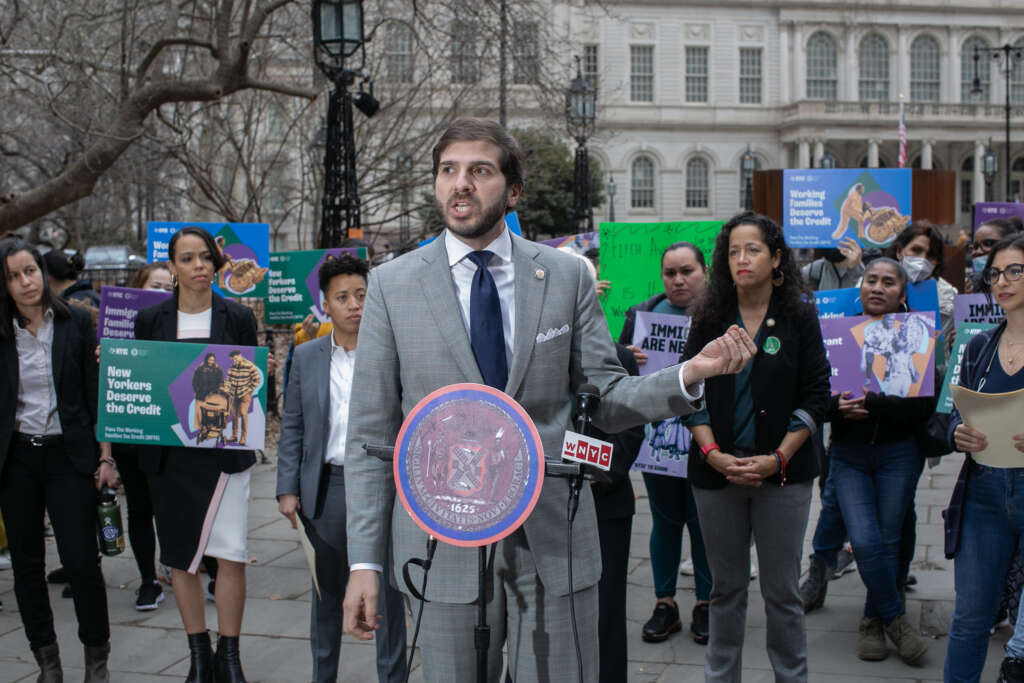“If the WFTC is passed, that’s $1,600 per child that can make a huge difference and allow families to concentrate on things that are actually important to their day-to-day life—like food, housing, and childcare—and their children’s long-term success.”
State Sen. Andrew Gounardes, who sponsored the Working Families Tax Credit bill, at a rally for the proposal in 2023. (William Alatriste/NYC Council Media Unit)
One in four New York City children live in poverty. That’s not a typo. It’s the reality of life here in America’s biggest and richest city.
You may not realize this hard fact unless you’re regularly interacting with people from all across the city. So many pockets of poverty are spread across New York City, not so far from pockets of privilege.
For example, Brownsville—one of the city’s poorest neighborhoods—is only five miles from brownstone Brooklyn, home to some of our richest. We must always remember that the opportunities many of us enjoy, especially when it comes to where we live and learn, do not extend to all our neighbors.
Right now, Gov. Kathy Hochul, the New York State Senate, and New York State Assembly can make things right for the roughly 420,000 children experiencing poverty here in our city. Children’s Defense Fund-New York and our youth advocacy partners call on lawmakers to pass the Working Families Tax Credit (WFTC), to alleviate the financial stresses that impact too many children and young families across our five boroughs.
Several ideas connected to the measure are being negotiated, right now, in Albany. These include increasing the maximum credit per child to $1,600 and indexing it to inflation, eliminating the minimum income requirement for low-income families, and expanding eligibility to cover children from birth to age 17.
All those ideas originated as recommendations from the New York State Child Poverty Reduction Advisory Council (CPRAC). While we hope even more of CPRAC’s recommendations will be adopted to help New York families thrive in the future, we’re encouraged by the strategic tools already proposed to address and eliminate child poverty right now. We hope they will be included in the state’s final budget when negotiations conclude soon.
We believe lawmakers should not make policy for people without the people’s voice. Those who are living in poverty, in a place where costs connected to childcare, food, and housing continue to skyrocket, are the ones who know what will best help them, their children, and their families.
That is why we hold a positive outlook. The WFTC will benefit thousands of New York City families if enacted with all the above in the budget. These recommendations were put together by experts and people who work with, and advocate for, families with lived experience in New York.
It’s extremely disappointing that New York has a massive budget and that we’re even thinking twice about giving more of it to children and families who are going to shape the future of our city and state. The WFTC will work because similar proposals have positively benefited the city’s —these policy changes are not just sound economics, they’re proven tools to drive impactful change.
As evidenced by the American Rescue Plan Act of 2021, child tax credits have the ability to lift millions of children out of poverty, ease financial burdens, and improve child and family wellbeing. When Congress allowed the temporary credit to expire, child poverty rates in New York state drastically rose the following year, surpassing pre-pandemic levels.
We understand there are many other needs to be addressed in New York City, but it cannot go without saying that poverty is a policy choice. When you look at other states, like Minnesota, and see how they are expanding policies centering children and families and how they are working to reduce their poverty statistics, one must ask why New York State cannot do the same.
If we continue the direction we are currently going, especially with possible federal cuts to health care, education, and public benefits, it’s possible nothing will really improve for children and families in New York.
If the WFTC is passed, that’s $1,600 per child that can make a huge difference and allow families to concentrate on things that are actually important to their day-to-day life—like food, housing, and childcare—and their children’s long-term success. Let’s get this important piece of legislation across the finish line, now, for the sake of all young people in our city!
Khin Mai Aung is state director, and Sabah Merchant is a senior policy associate, at the Children’s Defense Fund-New York.
The post Opinion: Pass the Working Families Tax Credit appeared first on City Limits.

